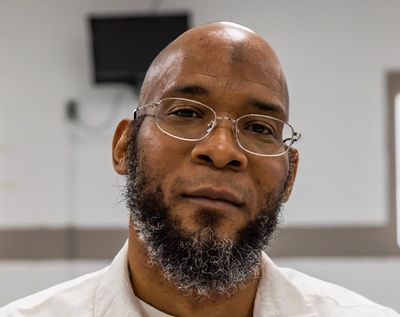Toriano Porter: What if Missouri got it wrong and executed an innocent man? Abolish the death penalty

What if we got it wrong?
On Tuesday, Missouri executed Marcellus “Khaliifah” Williams by lethal injection. Minutes before Williams was executed, I happened to stop at a protest held for him near Troost Avenue and 39th Street in Kansas City. It was by chance, as I was headed to another assignment.
But a sign held by someone in attendance caught my attention. It read: “What if we got it wrong?”
After reading that, I felt compelled to pull over and park a half block away. As I walked to the scene, I could sense the overwhelming amount of sadness surrounding this gathering. For about an half hour, I stood in solidarity with those who were there.
The death penalty is draconian and should end here in Missouri. Last year, at least 29 states had “either abolished the death penalty or paused executions by executive action,” according to the Death Penalty Information Center, or DPIC. Missouri isn’t among them, a very disheartening reality that state lawmakers must address.
After Williams’ mind-numbing execution, the Show-Me state should be the next to end this barbaric act. Taking someone’s life under the guise of justice is inhumane. It certainly doesn’t deter crime.
What if we got it wrong?
In 2001, Williams was convicted of first-degree murder in the 1998 death of former reporter Felicia Gayle of St. Louis. He was sentenced to death. Before he died, Williams, 55, spent more than two decades on death row.
What if we got it wrong?
In this case, an argument could be made that we did. Despite serious doubts about Williams’ guilt – his attorneys contend DNA evidence recovered from the scene excluded Williams as the killer – Missouri still sanctioned his death.
What if we got it wrong?
In this country, executing innocent prisoners isn’t unheard of. Since 1973, at least 196 people sentenced to death in the U.S. have been exonerated, according to the DPIC’s innocence database. Others weren’t as fortunate. For every eight prisoners put to death in America, one has been exonerated, the DPIC found.
After Williams’ death 100 people have now been executed in this state, the fifth most in the nation, DPIC data shows. Another reason to abolish the death penalty here: Four other Missouri prisoners were exonerated from death row, according to DPIC.
Most Americans – a record high 50% – believe the death penalty is applied unfairly, a 2023 Gallup poll found. The same year, support for the death penalty was at its lowest point in five years, Gallup reported.
But Black men like Williams accused of killing a white person such as Gayle were more likely than not to face the death penalty, according to DPIC.
“The lives of Black Missourians are valued less in Missouri,” the Missouri State Conference of the NAACP’s Nimrod Chapel said late Tuesday.
The veracity of Williams’ first-degree murder conviction was challenged in court. Even St. Louis County Prosecuting Attorney Wesley Bell fought to absolve Williams of the crime and entered a plea agreement that would have spared the condemned man’s life. But those efforts proved to be in vain.
In a statement, Bell wrote: “There were multiple points in the timeline when decisions could have been made that would have spared him the death penalty. If there is even the shadow of a doubt of innocence, the death penalty should never be an option. This outcome did not serve the interests of justice.”
Missouri Gov. Mike Parson had the power to stop this merciless killing but didn’t. As did the Missouri and United States Supreme courts. None of us should be surprised either failed to move to right this grave injustice.
Last year, Missouri was one of five states in the country that carried out executions. Four people – Amber McLaughlin, Michael Tisius, Johnny Johnson and Leonard “Raheem” Taylor, who maintained that he was innocent, died by lethal injection in 2023.
This year, in addition to Williams, Brian Dorsey and David Hosier died by lethal injection. On Dec. 3, Missouri is scheduled to execute Christopher Collings.
Prosecutor’s statement
In a statement, Parson wrote that no jury or judge ever found Williams’ claims of innocence credible. But Bell, a duly-elected prosecutor, did.
“Two decades of judicial proceedings and more than 15 judicial hearings upheld his guilty conviction, thus, the order of execution has been carried out,” Parson wrote.
In a statement released prior to Williams’ death, one of his attorneys, Tricia Rojo Bushnell of the Midwest Innocence Project, described this act as a “grotesque exercise of state power,” she wrote.
“Tonight, Missouri will execute an innocent man, Marcellus ‘Khaliifah’ Williams,” Bushnell wrote. “The victim’s family opposes his execution. Jurors, who originally sentenced him to death, now oppose his execution. The prosecutor’s office that convicted and sentenced him to death has now admitted they were wrong and zealously fought to undo the conviction and save Mr. Williams’ life. More than one million concerned citizens and faith leaders implored Governor Parson to commute Marcellus’s death sentence. Missouri will kill him anyway.
“That is not justice. And we must all question any system that would allow this to occur. The execution of an innocent person is the most extreme manifestation of Missouri’s obsession with ‘finality’ over truth, justice, and humanity, at any cost.”
In this case, the question we must ask ourselves for a very long time: What if we got it wrong?
Toriano Porter is an opinion writer and member of the Kansas City Star’s editorial board.